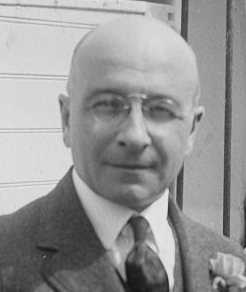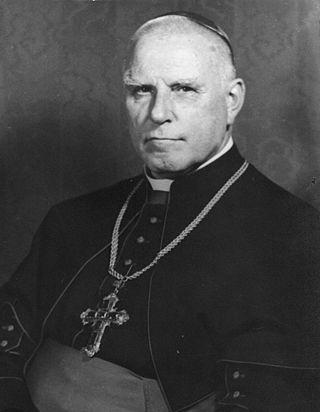
Alexis Carrel was a French surgeon and biologist who spent most of his scientific career in the United States. He was awarded the Nobel Prize in Physiology or Medicine in 1912 for pioneering vascular suturing techniques. He invented the first perfusion pump with Charles Lindbergh opening the way to organ transplantation. Carrel was also a pioneer in tissue culture, transplantology and thoracic surgery. He is known for his leading role in implementing eugenic policies in Vichy France.

Eugenics is a set of beliefs and practices that aim to improve the genetic quality of a human population. Historically, eugenicists have altered various human gene frequencies by inhibiting the fertility of people and groups they considered inferior, or promoting that of those considered superior.

Sir Francis Galton was a British polymath and the originator of eugenics during the Victorian era; his ideas later became the basis of behavioral genetics.

Aktion T4 was a campaign of mass murder by involuntary euthanasia in Nazi Germany. The term was first used in post-war trials against doctors who had been involved in the killings. The name T4 is an abbreviation of Tiergartenstraße 4, a street address of the Chancellery department set up in early 1940, in the Berlin borough of Tiergarten, which recruited and paid personnel associated with Aktion T4. Certain German physicians were authorised to select patients "deemed incurably sick, after most critical medical examination" and then administer to them a "mercy death". In October 1939, Adolf Hitler signed a "euthanasia note", backdated to 1 September 1939, which authorised his physician Karl Brandt and Reichsleiter Philipp Bouhler to begin the killing.
The Eugenics Board of North Carolina (EBNC) was a State Board of the U.S. state of North Carolina formed in July 1933 by the North Carolina State Legislature by the passage of House Bill 1013, entitled "An Act to Amend Chapter 34 of the Public Laws of 1929 of North Carolina Relating to the Sterilization of Persons Mentally Defective". This Bill formally repealed a 1929 law, which had been ruled as unconstitutional by the North Carolina Supreme Court earlier in the year.

The Descent of Man, and Selection in Relation to Sex is a book by English naturalist Charles Darwin, first published in 1871, which applies evolutionary theory to human evolution, and details his theory of sexual selection, a form of biological adaptation distinct from, yet interconnected with, natural selection. Darwin used the word "descent" to mean lineal descendant of ancestors. The book discusses many related issues, including evolutionary psychology, evolutionary ethics, evolutionary musicology, differences between human races, differences between sexes, the dominant role of women in mate choice, and the relevance of the evolutionary theory to society.
Joel Feinberg was an American political and legal philosopher. He is known for his work in the fields of ethics, action theory, philosophy of law, and political philosophy as well as individual rights and the authority of the state. Feinberg was one of the most influential figures in American jurisprudence of the last fifty years.
Social degeneration was a widely influential concept at the interface of the social and biological sciences in the 18th and 19th centuries. During the 18th century, scientific thinkers including Georges-Louis Leclerc, Comte de Buffon, Johann Friedrich Blumenbach, and Immanuel Kant argued that humans shared a common origin but had degenerated over time due to differences in climate. This theory provided an explanation of where humans came from and why some people appeared differently from others. In contrast, degenerationists in the 19th century feared that civilization might be in decline and that the causes of decline lay in biological change. These ideas derived from pre-scientific concepts of heredity with Lamarckian emphasis on biological development through purpose and habit. Degeneration concepts were often associated with authoritarian political attitudes, including militarism and scientific racism, and a preoccupation with eugenics. The theory originated in racial concepts of ethnicity, recorded in the writings of such medical scientists as Johann Blumenbach and Robert Knox. From the 1850s, it became influential in psychiatry through the writings of Bénédict Morel, and in criminology with Cesare Lombroso. By the 1890s, in the work of Max Nordau and others, degeneration became a more general concept in social criticism. It also fed into the ideology of ethnic nationalism, attracting, among others, Maurice Barrès, Charles Maurras and the Action Française. Alexis Carrel, a French Nobel Laureate in Medicine, cited national degeneration as a rationale for a eugenics programme in collaborationist Vichy France.

Ernst Rüdin was a Swiss-born German psychiatrist, geneticist, eugenicist and Nazi, rising to prominence under Emil Kraepelin and assuming the directorship at the German Institute for Psychiatric Research in Munich. While he has been credited as a pioneer of psychiatric inheritance studies, he also argued for, designed, justified and funded the mass sterilization and clinical killing of adults and children.

Joseph Spencer DeJarnette was the director of Western State Hospital from 1905 to November 15, 1943. He was a vocal proponent of racial segregation and eugenics, specifically, the compulsory sterilization of the mentally ill.

The social policies of eugenics in Nazi Germany were composed of various ideas about genetics. The racial ideology of Nazism placed the biological improvement of the German people by selective breeding of "Nordic" or "Aryan" traits at its center. These policies were used to justify the involuntary sterilization and mass-murder of those deemed "undesirable".
Law for the Prevention of Genetically Diseased Offspring or "Sterilisation Law" was a statute in Nazi Germany enacted on July 14, 1933, which allowed the compulsory sterilisation of any citizen who in the opinion of a "Genetic Health Court" suffered from a list of alleged genetic disorders – many of which were not, in fact, genetic. The elaborate interpretive commentary on the law was written by three dominant figures in the racial hygiene movement: Ernst Rüdin, Arthur Gütt and the lawyer Falk Ruttke.

Three International Eugenics Congresses took place between 1912 and 1932 and were the global venue for scientists, politicians, and social leaders to plan and discuss the application of programs to improve human heredity in the early twentieth century.
Compulsory sterilization in Canada is an ongoing practice that has a documented history in the provinces of Alberta, Saskatchewan, and British Columbia.

The Hereditary Health Court, also known as the Genetic Health Court, was a court that decided whether people should be forcibly sterilized in Nazi Germany. That method of using courts to make decisions on hereditary health in Nazi Germany was created to implement the Nazi race policy aiming for racial hygiene.
The history of eugenics is the study of development and advocacy of ideas related to eugenics around the world. Early eugenic ideas were discussed in Ancient Greece and Rome. The height of the modern eugenics movement came in the late 19th and early 20th centuries.

During the Second World War, the Roman Catholic Church protested against Aktion T4, the Nazi involuntary euthanasia programme under which 300,000 disabled people were murdered. The protests formed one of the most significant public acts of Catholic resistance to Nazism undertaken within Germany. The "euthanasia" programme began in 1939, and ultimately resulted in the murder of more than 70,000 people who were deemed senile, mentally handicapped, mentally ill, epileptics, cripples, children with Down's Syndrome, or people with similar afflictions. The murders involved interference in Church welfare institutions, and awareness of the murderous programme became widespread. Church leaders who opposed it – chiefly the Catholic Bishop Clemens August von Galen of Münster and Protestant Bishop Theophil Wurm – were therefore able to rouse widespread public opposition.
Institutions for Defective Delinquents (IDDs) were created in the United States as a result of the eugenic criminology movement. The practices in these IDDs contain many traces of the eugenics that were first proposed by Sir Francis Galton in the late 1800s. Galton believed that "our understanding of the laws of heredity [could be used] to improve the stock of humankind." Galton eventually expanded on these ideas to suggest that individuals deemed inferior, those in prisons or asylums and those with hereditary diseases, would be discouraged from having children.
Gertrude Anna Davenport, was an American zoologist who worked as both a researcher and an instructor at established research centers such as the University of Kansas and the Cold Spring Harbor Laboratory where she studied embryology, development, and heredity. The wife of Charles Benedict Davenport, a prominent eugenicist, she co-authored several works with her husband. Together, they were highly influential in the United States eugenics movement during the progressive era.

Friedrich Wilhelm Schallmayer was Germany's first advocate of eugenics who, along with Alfred Ploetz, founded the German eugenics movement. Schallmayer made a lasting impact on the eugenics movement.












